
Updated on: July 4, 2025
- 🥇 TotalAV : Offers excellent cloud-based malware protection, advanced WebShield anti-phishing, an unlimited-data VPN, free ad blocker, and powerful device optimization tools that are especially helpful for older or slower Android devices — all wrapped in an intuitive, easy-to-use interface.
I downloaded, installed, and tested the most popular Android antivirus apps. I wanted to find the best tool to protect me from dangerous apps, webpages, and other threats. Unfortunately, I quickly learned that most Android antivirus apps are terrible — they failed to detect sophisticated malware, drained my phone’s battery, and even harvested my data for advertisers.
The good news is that there are some excellent internet security apps out there. They offer a wide range of useful features, such as real-time malware protection, anti-phishing protection, virtual private networks (VPNs), anti-theft tools, spam filters, and parental controls.
After weeks of testing, I found the 10 best Android antiviruses on the market. All of the apps below performed excellently in my tests, and they can be installed onto almost all Android smartphones and tablets. (Chromebook users can look here for my favorite Chromebook-compatible apps).
As a quick money-saving tip, click on the links on this page for the best deals. You’ll get lower prices and stronger money-back guarantees than buying directly from the Google Play Store.
Quick Summary of the Best Android Antivirus Apps in 2025
1. 🥇TotalAV — #1 Overall Pick for Best Android Antivirus of 2025

TotalAV is my favorite Android antivirus in 2025. It provides secure anti-malware protection, great additional features, and excellent device optimization tools. Like all of TotalAV’s apps, the Android version is easy to use. It’s also very effective, detecting 99.6% of Android-specific malware files on my device during testing. The real-time scanner didn’t affect my phone’s battery, either, as it’s cloud-based and lightweight. Moreover, TotalAV only collects minimal information while scanning.
TotalAV’s device optimization tools are the best optimizers of any antivirus software I’ve tested, and they’re especially useful for old or slow Androids. When I scanned my Android tablet for duplicates, junk, and cache files, TotalAV freed up over 1 GB of much-needed disk drive space. The scan ran smoothly without slowing down my device. I also really like the duplicate photo and video finder. I had tons of near-identical images that I could quickly delete.

TotalAV includes a few more decent security features:
- VPN.
- Anti-phishing protection.
- Advanced ransomware protection.
- Secure browser.
- App locker.
- Ad blocker.
- Password manager.
- Data breach monitoring.
- Identity theft monitoring (US only).
I really like TotalAV’s ad blocker, which protects against pop-ups, trackers, and even video ads — including on YouTube, where many blockers fall short. It’s especially useful if you browse ad-heavy websites on your Android phone or tablet, helping to improve page load speeds and even save mobile data. Plus, it’s easy to use, customizable, and completely free on Android.
TotalAV’s WebShield is a powerful anti-phishing tool that blocks malicious websites, fake login pages, and online malware distributors on your Android device. During my tests, it effectively stopped access to dangerous links and scam sites, which is especially useful for users who frequently browse or shop on their phones. Plus, US-based users get dark web breach alerts, including the exact date of the breach, so you can quickly change compromised login details.
TotalAV’s unlimited-data VPN is better than both Norton’s and Bitdefender’s VPN, ranking #1 on our list of the best antiviruses with VPNs. It provides access to almost 100 servers worldwide, has a kill switch and no-logs policy, works with streaming sites such as Netflix and Disney+, and maintains fast speeds. The secure browser has added protections and uses DuckDuckGo’s search engine, but even if you stick with your favorite browser, you’ll benefit from Web Shield, which blocks dangerous sites. They work well on all types of Android devices, including tablets.

All of TotalAV’s internet security suites are compatible with Android devices. The multi-device plans are way cheaper than the Android subscription, starting at $19.00 / year, and providing excellent antivirus protection for PC, Mac, and iOS as well. Every annual plan is covered by a 30-day money-back guarantee.
Bottom Line:
TotalAV is the best antivirus for Android. It comes with cloud-based malware protection and excellent device optimization tools. The scanner detected all the malware in my testing, and the real-time protection didn’t drain my battery at all. TotalAV also comes with an unlimited-data VPN that works with all top streaming sites, a great ad-blocker, and a powerful anti-phishing tool. Moreover, there’s a 30-day money-back guarantee on all of TotalAV’s annual plans.
Read the full TotalAV review here >
2.🥈 Norton — Excellent Feature-Rich Android App + AI-Based Scanner

Norton Mobile Security includes an Android internet security app with additional tools to protect your privacy. It has a reliable anti-malware scanner and a lot of extra features. During my tests, I ran Norton’s AI-based malware scanner against a wide range of Android threats, including malicious apps and dangerous files. It removed 100% of the malware from my device, and the scan took just a few minutes. The app didn’t impact my device’s performance or battery life, and in terms of privacy, Norton only collects minimal information, which it doesn’t share with any third parties.
Norton includes lots of handy security features, including:
- App Advisor.
- SMS filter.
- Genie Scam Protection (SMS & web).
- Anti-phishing protection.
- Wi-Fi monitoring.
- Secure browser.
- Parental controls.
- VPN.

I really like Norton’s App Advisor. It scans the Google Play Store and warns you about malicious apps before you download them. Additionally, it provides a useful list of every app on your phone, organized by permissions and threat level. I used it to remove a malicious app and a few others that were collecting excessive personal information about me. Norton runs scans in real time, so you’ll be alerted to threats as soon as they arise.
Norton’s anti-phishing protection is also great — it blocked most phishing and risky sites I tried opening. It works on every major mobile browser and protects you from dangerous links on social media sites and texting apps. Norton also scans links you receive in text messages and can even block spam messages from appearing in your inbox.

Other notable features include an unlimited-data VPN. It has a split-tunneling feature, a kill switch, and an integrated tracker blocker. It isn’t as good as the best standalone VPNs, and it wasn’t nearly as fast as TotalAV, but it’s still pretty good.
Norton Mobile Security covers 1 Android device and costs $19.99 / year*, but it’s missing the VPN and most identity protections. Norton’s premium bundles are a great option if you want those features or have multiple devices to protect. The 360 Deluxe plan ($49.99 / year*) brings the most value as it includes most features and covers up to 5 devices. All plans are backed by a generous 60-day money-back guarantee.
Bottom Line:
Norton Mobile Security is a reliable Android antivirus with tons of additional security features. Its AI-based antivirus scanner detected 100% of malware during testing. I’m also a big fan of Norton’s App Advisor and anti-phishing protection, but its VPN could be better. Norton Mobile Security is available for mobile users as a standalone app or bundled with Norton’s antivirus packages, and there’s a generous 60-day money-back guarantee on all plans.
Read the full Norton review here >
3.🥉 Bitdefender — Lightweight Malware Scanner With a Fast VPN
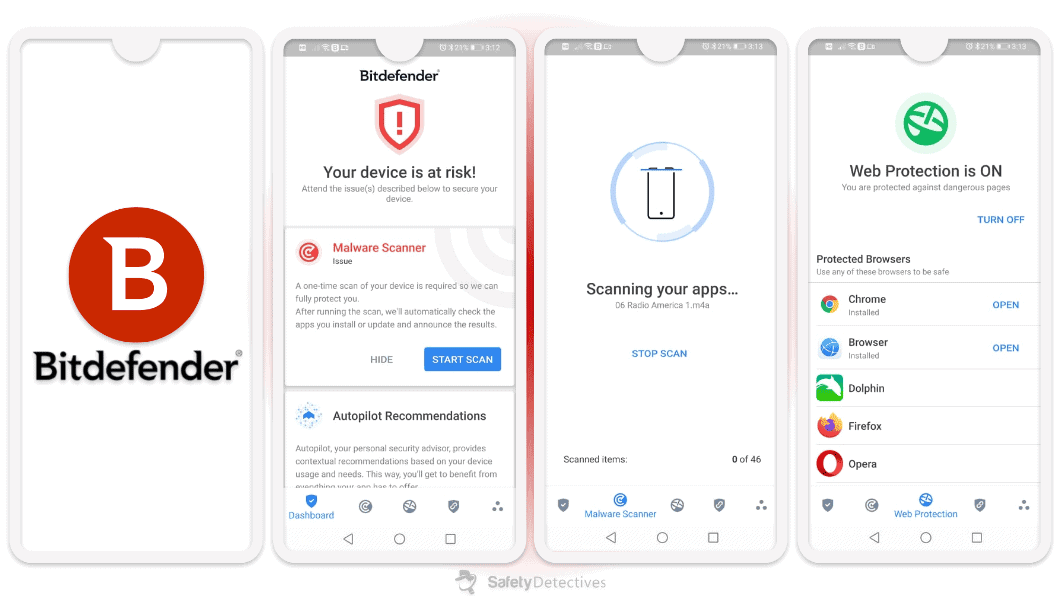
Bitdefender’s Mobile Security plan comes with a lightweight antivirus app for Android with tons of helpful features. Its cloud-based scanning engine uses machine learning to detect the latest malware threats. When I tested the scanner, it removed all of the malware from my phone and tablet in just a few minutes. The real-time protection worked perfectly, barely impacting my phone’s battery or performance. The only downside is that Bitdefender collects more user data than TotalAV.
Bitdefender has an innovative App Anomaly Detection feature for Android. This advanced technology continually monitors app behavior and immediately flags any suspicious activities. It even works when Bitdefender is closed, so you’re always protected.

The app also comes with a VPN powered by Hotspot Shield, but the better version of the VPN requires a separate app. The VPN included with the antivirus is barebones, while the dedicated VPN is fully featured, with a kill switch, split tunneling, multiple protocols, and a wide selection of servers. That said, I enjoyed good speeds on both apps. With a Mobile Security subscription, you can use both apps. Most plans have a low data limit, but you can get unlimited data by getting the most comprehensive multi-platform bundle.
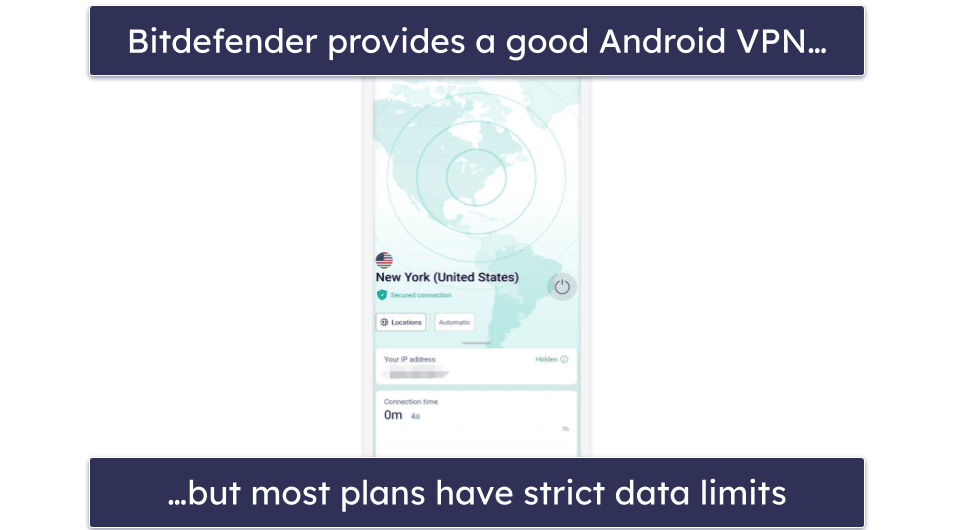
I’m pretty impressed with Bitdefender’s mobile app’s wide range of features. You also get:
- App locker.
- SMS scam filter.
- Data breach monitoring.
- Anti-theft tools.
- Web protections.
At $14.99 / year, Bitdefender Mobile Security is a good value, but it can only protect a single Android phone. If you have multiple devices, you can get a better deal by subscribing to one of the multi-platform plans. Antivirus Plus costs $34.99 / year and covers up to 3 devices. But my favorite plan is Total Security ($54.99 / year), which includes every feature save the unlimited-data VPN. All of Bitdefender’s plans are covered by a 30-day money-back guarantee.
Bottom Line:
Bitdefender Mobile Security provides lightweight protection with some great extra features. The malware scanner scored 100% in my device scanning and real-time protection testing. I also like Bitdefender’s anti-phishing measures and VPN, which provides 200 MB of daily data usage (you’ll need to upgrade to the priciest plan to get unlimited data). You can buy Bitdefender as a standalone Android app or as part of Bitdefender’s multi-device bundles. There’s a 30-day money-back guarantee on all of Bitdefender’s subscriptions.
Read the full Bitdefender review here >
4. McAfee — Best Android Web Protections

McAfee’s feature-rich Android app provides excellent malware protection and some of the best web protections on the market. McAfee’s scanner detected all of the malware I downloaded to my Android tablet, but the scanning process affected my battery life much more than TotalAV and Norton.
The malware scanner works well, removing both apps and dangerous .ZIP and .APK files. I like how the app issues you with a protection score that you can increase by optimizing your phone’s security settings. US customers can also set up McAfee’s identity theft monitoring service to get the highest possible score.

McAfee’s Android app also comes with excellent anti-phishing protection. In my tests, it successfully blocked both risky sites and malicious downloads. It also scans URLs sent in text messages, making it easy to identify scammers.
In addition to helping you avoid dangerous sites, McAfee’s Android app will alert you to unsecured networks. The Wi-Fi scanner analyzes networks for security issues and alerts you if you connect to an unsecured hotspot. However, the strongest privacy tool is the VPN, which you can use to anonymize your web traffic.

I recommend Android users pick up McAfee Premium for $49.99 / year. It provides unlimited device licenses, so you can also protect your desktop and iOS devices. You’ll need the Advanced plan ($89.99 / year) for extensive identity protections. All plans are backed by a 30-day money-back guarantee.

Bottom Line:
McAfee is a secure antivirus app for Android with a robust set of web protections. McAfee’s malware scanner is excellent at detecting and removing malware, the anti-phishing protection blocks all risky sites, and the dark web monitoring notifies you if your sensitive data is leaked in a data breach. There’s a 30-day money-back guarantee on all of McAfee’s plans.
Read the full McAfee review here >
5. Avira — Good Privacy Protections

Avira Security Antivirus & VPN provides a cloud-based malware scanner with lots of features. Avira’s malware scanner detected all of the malware files in my testing, but I was disappointed with how quickly it drained my battery during scans. TotalAV, on the other hand, also uses cloud-based scanning but is much more lightweight, making it a better choice for preserving battery life, especially on Android.
The malware scanner works well — and it’s 100% free. It removed every malicious app on my phone and provided a list of every app with invasive permissions. On the flip side, it doesn’t rate apps based on overall permissions. It only shows permission types, and you have to tap the permissions to see which apps have them.
Here are Avira’s additional features:
- Anti-phishing protection.
- Breach monitoring.
- Call blocker.
- App locker.
- Camera and microphone protection.
- Web protection.
- Password manager.
- VPN (100 MB/day, or unlimited data on Avira Prime).
- System tune-up tools.

I like the VPN and system tune-up tools the most. The VPN is intuitive (one of my top choices for torrenting), and the system tune-up tools are excellent for clearing memory and storage. Unfortunately, you’ll have to upgrade to a paid plan to get unlimited data. The web protections (another premium feature) are great, too, providing security that matches the VPN’s privacy features.
You’ll need the Prime plan to get all of Avira’s Android features — including the unlimited-data VPN and web protections. It costs $59.99 / year and covers up to 5 devices (including Android, PC, Mac, & iOS). Avira’s annual plans are covered by a 60-day money-back guarantee.
Bottom Line:
Avira Security Antivirus & VPN is a full-featured antivirus app for Android with more features than many competing brands. Avira detected the majority of the malware in my testing, and its anti-phishing protection, system tune-up tools, and VPN are all good. Avira offers a 60-day money-back guarantee on all of its yearly plans.
Read the full Avira review here >
6. ESET — Strong Malware Protection
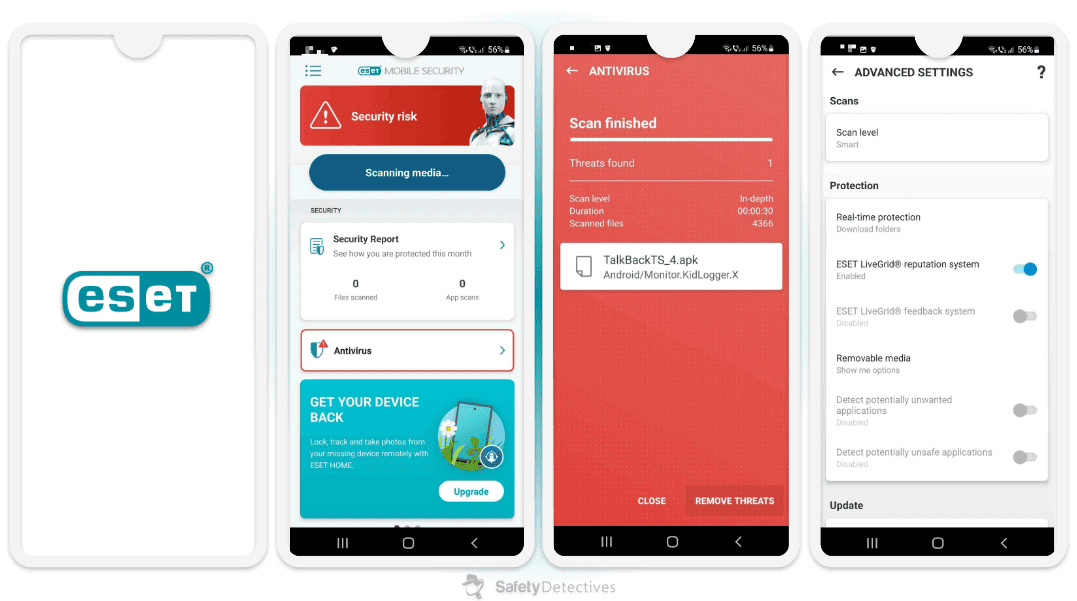
ESET Mobile Security comes with an Android app with a thorough malware scanner, achieving a 100% detection rate during my tests. Its real-time protection effectively stopped ransomware, spyware, and other malicious files.
ESET comes with a lot of additional features:
- Anti-phishing protection.
- App lock.
- Payment protection.
- Wi-Fi network scanner.
- Anti-theft protection.
- Call filter.
- App auditor.
- Payment protection.

I found the anti-theft protections very comprehensive. If your phone is stolen, you can use the anti-theft dashboard on your computer to find it. You can also make it so your phone is automatically locked whenever the SIM is removed. The ability to take photos of any potential thief is a nice addition.
The anti-phishing protections are pretty good, too. They successfully blocked the majority of dangerous sites I tried to visit. However, they are over-sensitive, and I found it difficult to add false positives to the whitelist. There’s also a payment protection tool that provides extra security by encrypting your keystrokes when shopping on your phone.
ESET has a decent VPN on its most expensive plan, Ultimate, but it costs a whopping $179.99 / year. I think TotalAV’s VPN is better in terms of security and convenience.
ESET Mobile Security can protect up to 10 Android devices. Its annual plan starts at $12.99 / year for 1 device. To get coverage for 3 devices (including PCs and Macs), you can upgrade to Premium Security for just $59.99 / year. ESET’s plans come with a 30-day free trial (no credit card required) and are backed by a 30-day money-back guarantee.
Bottom Line:
ESET Mobile Security offers powerful malware protection and many extra features. Its anti-theft tools and application auditor are particularly good. However, it lacks some valuable extras top competitors offer, like system tune-up tools. ESET provides a 30-day money-back guarantee on all of its plans.
Read the full ESET review here
7. Kaspersky — Powerful Anti-Theft Features
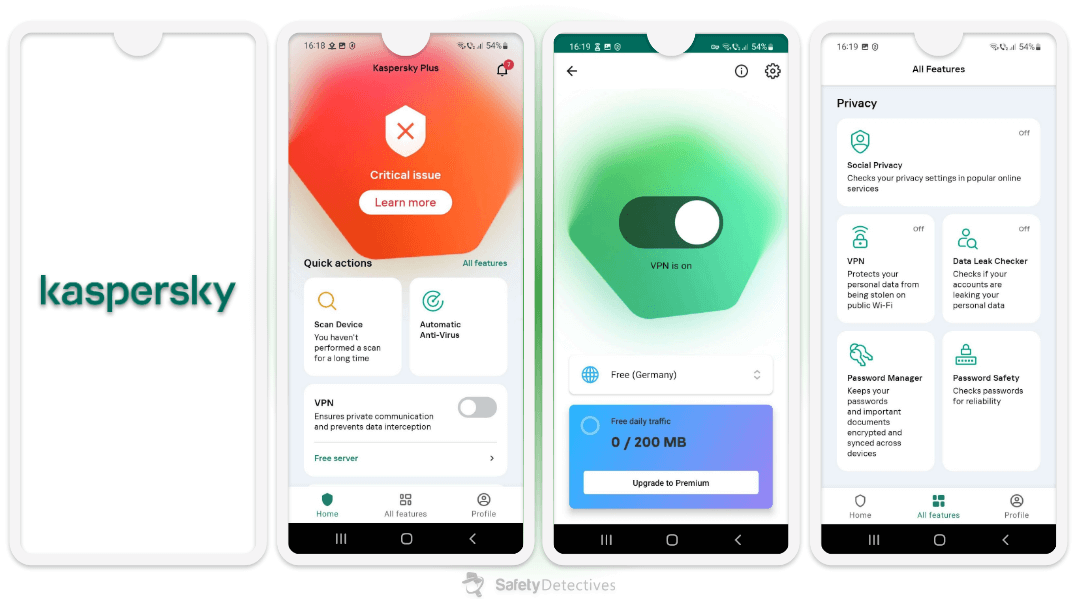
Kaspersky’s Android app is currently unavailable from the Google Play Store, but you can download the .APK file from Kasperksy’s site. There’s no evidence to suggest that Kaspersky’s products present any privacy risk to their users. However, if you’re still wary (or reside in the US, where sales of Kaspersky have been banned), there are plenty of great alternatives.
Kaspersky has a powerful Android malware scanner and some of the best anti-theft tools on the market. It detected all of the 80+ malware samples I put on my phone during a full scan and took less than 5 minutes. Kaspersky doesn’t sell the premium Android antivirus on its own, so if you want the full version, you’ll need to get one of Kaspersky’s bundles.
Its real-time protection stopped me from downloading dangerous apps from the Google Play Store, intercepting and automatically placing them into quarantine. However, it doesn’t warn you about risky apps before you download them.
Kaspersky’s Android app also comes with the following additional features:
- Anti-phishing protection.
- Anti-theft.
- App lock.
- Call filter.
- Social media privacy optimizer.
- Optimization tools.
- VPN (unlimited data on Plus and Premium plans).
- Home Wi-Fi monitor.
- Password manager (separate download).

The anti-theft tools are Kaspersky’s standout feature. From your computer or any other device, you can take photos, set off an alarm, lock your device, and even perform a factory reset. The optimization tools saved a bit of space on my device, but the impact was smaller than with TotalAV, which managed to clean up over 1 GB of much-needed disk drive space.
To get phishing protection and other premium features, you’ll need Kaspersky’s Standard plan. It can protect 3 devices (including PCs, Macs, and iPhones) for $27.33 / year. The Plus plan starts from $36.90 / year and adds a VPN with unlimited data, home Wi-Fi monitoring, and a password manager (separate app). Every plan is covered by a 30-day money-back guarantee.
Bottom Line:
Kaspersky offers a solid antivirus app with particularly good anti-theft tools. Kaspersky caught every malware sample I threw at it during my testing and blocked most phishing sites I visited. However, it lacks many features, such as in-depth identity theft protections. There’s a 30-day money-back guarantee on all of its plans.
Read the full Kaspersky review here
8. Panda — Compatible With Wear OS Smart Watches
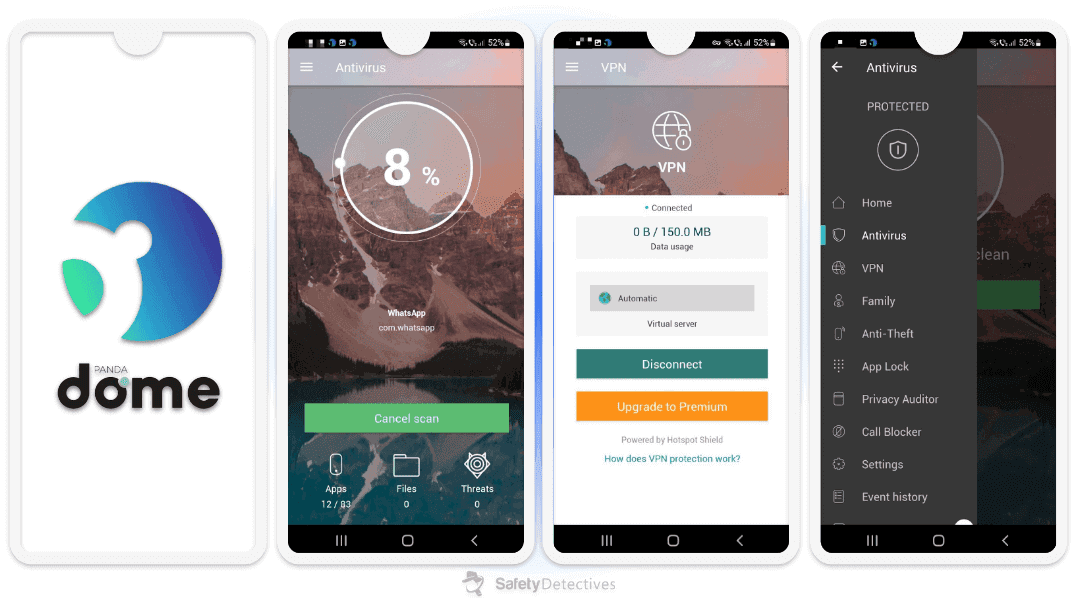
Panda Dome’s Android app features a good malware scanner with a 95% detection rate and excellent real-time protection that blocks all attempted malware downloads.
The Android app comes with:
- App lock.
- Anti-theft tools (including motion alerts).
- App privacy auditing.
- Call blocker.
- Parental controls.
- VPN (150 MB/day on most plans).
I like how Panda’s anti-theft tools have Android smartwatch connectivity, which allows you to control your antivirus from your wrist. The anti-theft tools will sound an alarm if your watch and your device are too far away from each other. You can even make it so you’ll get an alert on the web dashboard if your phone changes location. It’s my favorite feature after the call filter, which blocked tons of annoying (and dangerous) cold calls.

However, Panda’s other features are unimpressive compared to its competitors. For example, its privacy auditing isn’t as good as Norton’s app advisor, and the VPN severely lacks features and has a low data limit on most plans, unlike TotalAV’s unlimited-data VPN, which is compatible with top streaming platforms.
I recommend getting one of Panda’s multi-platform plans. They start at $22.50 / year and can cover unlimited devices (including PCs, Macs, and iPhones). To get the unlimited-data VPN, password manager, and Android parental controls, you’ll need Panda Dome Premium, which starts at $63.00 / year. All of Panda’s plans are backed by a 30-day money-back guarantee.
Bottom Line:
Panda Dome has a secure Android antivirus with good malware detection. That said, the rest of its security features are disappointing. It has a decent app auditing tool and some unique anti-theft features, but it doesn’t have as many extra features as some top competitors, and its VPN leaves something to be desired. Panda’s plans have a 30-day money-back guarantee, so you can try it out to see if it’d be a good fit for you.
Read the full Panda review here >
9. Trend Micro — Good Smishing Blocker
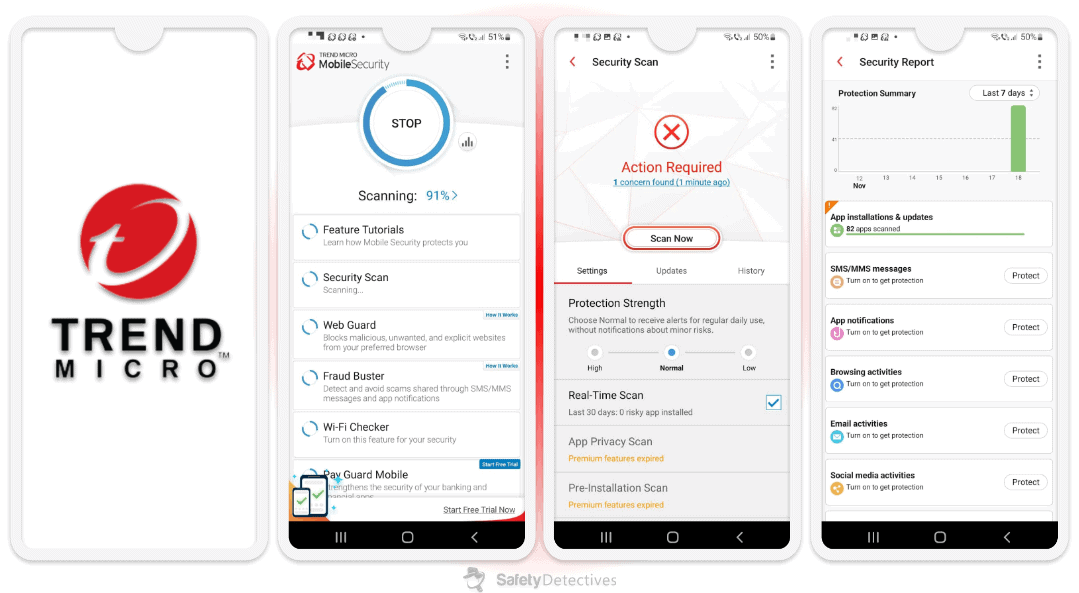
Trend Micro Mobile Security has a pretty good malware scanner — it detected almost all of the virus samples I downloaded onto my phone. Its web protections also worked well, preventing me from visiting several malicious and fraudulent websites during my tests. However, in general, Trend Micro lacks many features that competitors offer.
Trend Micro has the following additional features:
- Wi-Fi monitoring.
- System tune-up tools.
- Anti-theft tools.
- Parental controls.
- Social media privacy checker.
- VPN (separate app).
- Password manager (separate app).
I like Trend Micro’s ability to stop SMS-based phishing (smishing), which warns you if it detects a scam URL in any SMS message (Norton also offers this feature). The web protections work well, too, but the call spam filter wasn’t effective in my tests.
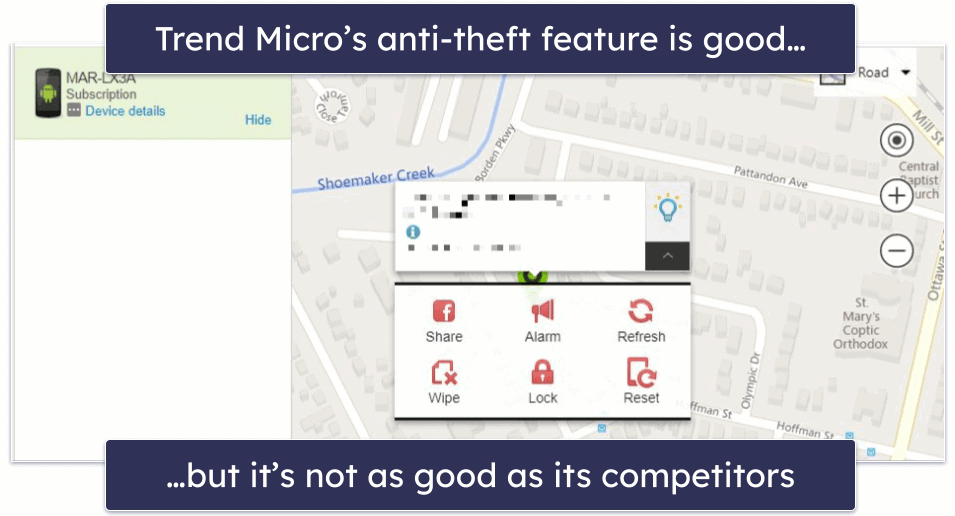
The anti-theft tools (which can take a photo of anyone who steals your phone) are pretty good, but other features are lacking. The tune-up tools didn’t improve my phone’s performance (and the app itself used more resources than I’d like), and it didn’t remove nearly as much junk as TotalAV.
Trend Micro Mobile Security starts at $29.99 / year for 1 device. Trend Micro Maximum Security, however, is its best value plan, at just $49.95 / year. For that price, you’ll also get a password manager, parental controls, and much more, as well as coverage for up to 5 Windows, macOS, and iOS devices. Trend Micro’s VPN is only offered as part of its highest-priced plan, Trend Micro Premium Security Suite ($54.95 / year), which is $54.95 / year. All of Trend Micro’s plans are covered by a 30-day money-back guarantee.
Bottom Line:
Trend Micro Mobile Security has great malware detection rates and anti-phishing protections. It also includes Wi-Fi monitoring, system tune-up tools, and anti-theft tools. However, it doesn’t offer as many extras as other top Android antiviruses, and none of its additional features are truly outstanding. Trend Micro backs all of its plans with a 30-day money-back guarantee.
Read the full Trend Micro review here
10. Malwarebytes — Good No-Frills Antivirus
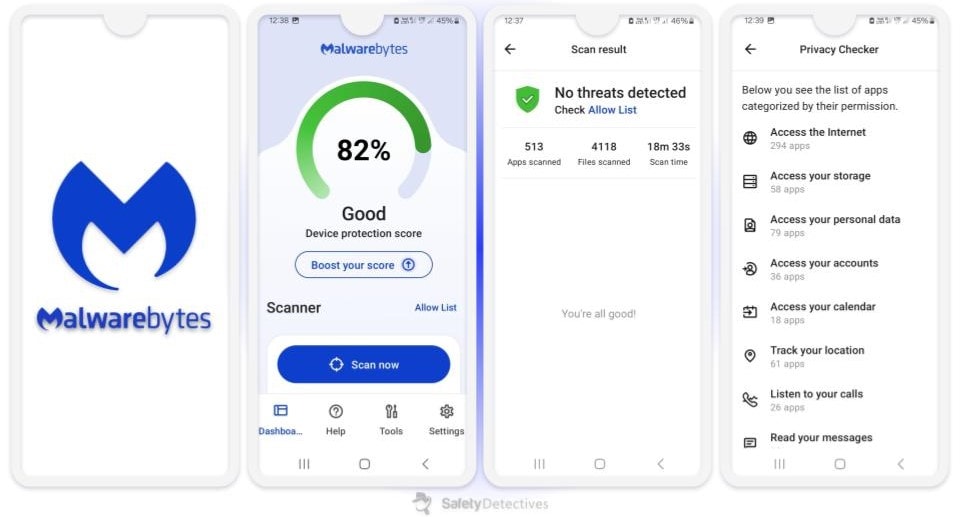
Malwarebytes has a decent, minimalistic Android antivirus with an intuitive interface. Its malware scanner is incredibly lightweight, having little to no effect on my battery or my device’s performance speeds, but it only found 95% of the malware I hid on my device for testing purposes — much less than the top antiviruses on this list.
Malwarebytes has very few additional features:
- Smishing protections.
- Data leak checker.
- Privacy Checker.
- VPN.
- App manager.

Privacy Checker, which analyzes the apps on your phone, is pretty good. It lets you quickly review your apps’ settings and permissions, including which apps can read your personal information, track your location, monitor your calls, cost you money, and more. I prefer Norton’s App Advisor, though, as it makes it more immediately clear which apps pose privacy risks (with Malwarebytes, you have to click on individual risk categories to see potential threats). It’s also a shame that Malwarebytes can’t identify apps that may pose a security or privacy risk before they’re installed.
You can protect your Android by subscribing to Malwarebytes Standard for $44.99 / year. Plus subscriptions cost $59.99 / year and add an unlimited-data VPN. Both plans protect up to 20 devices, including Macs, PCs, and iPhones. All plans come with a 60-day money-back guarantee.
Bottom Line:
Malwarebytes’s Android app is pretty good at removing malware from your device. It also has a decent privacy auditing tool and extras like a VPN and data leak checker. It definitely doesn’t offer as much value as the best Android antiviruses, which have tons of additional features. Users who just want a lightweight and minimalistic antivirus may be happy with that, though. You can try out Malwarebytes risk-free by taking advantage of its 60-day money-back guarantee.
Read the full Malwarebytes review here >
Quick Comparison Table
Testing Methodology: Comparison & Ranking Criteria
To identify the best Android antivirus apps for 2025, I used our detailed testing methodology to assess each product’s malware detection, threat protection, performance impact, usability, additional features, and overall value. Here’s how I approached the evaluation of these essential security tools for Android devices.
- I tested malware detection capabilities. I thoroughly tested each antivirus app on this list for its ability to detect and neutralize various types of malware, including ransomware, spyware, and viruses. This included analyzing their effectiveness against threats embedded in apps from the Google Play Store, as well as those found in emails, text messages, and websites.

- I evaluated comprehensive threat protection. A top-notch Android internet security app should have a full range of cybersecurity features, like web protection, anti-phishing, junk cleaners, an app lock, a VPN, and an advanced antivirus scanner. All the brands on this list offer at least one of these tools, and some (like TotalAV) offer all.
- I considered what each company does with user data. Every Android antivirus app needs access to some level of user data. There’s no way around that fact. However, some developers take this way too far, harvesting sensitive data and selling it to third parties. I only selected apps that collect minimal data.
- I checked for additional features. I looked for apps offering more than just basic virus protection, including system optimization tools, anti-theft features, parental controls, and more. These additional features can significantly enhance privacy, security, and device performance.

- I considered value for money. I compared the cost against the range of features offered by each antivirus app. All apps on this list provide excellent value, featuring comprehensive security tools such as malware protection, anti-phishing measures, and VPNs at a reasonable price. Each app also offers a money-back guarantee, allowing you to try them risk-free.
Top Brands That Didn’t Make the Cut
- Avast. Avast includes a good malware scanner inside an intuitive interface, but the lack of a password manager and parental controls stops it from making this list.
- AVG. AVG’s mobile app is pretty good and includes excellent anti-theft protections. However, its parental controls aren’t as comprehensive as other options on this list, and I didn’t like having to download multiple apps to access every feature.
- Webroot. Webroot has a decent, lightweight malware scanner, but it isn’t great at stopping ransomware. It also offers minimal web protection and lacks many bonus features for Android.
- Sophos. Sophos offers decent antivirus tools for many users. But while the Sophos Android app is pretty good in terms of features, the interface isn’t as intuitive and easy to use as the other apps on this list.
- Trustd. Trustd is a free antivirus app with great malware detection and anti-phishing protection for Android. Unfortunately, I found its constant push notifications a little intrusive, and it doesn’t have as many extra features as the other antiviruses on this list.
Frequently Asked Questions
Do I need an antivirus on my Android?
Yes, you need an antivirus on your Android — but it’s important to understand why. Hackers specifically target Android devices for two reasons:
- Android’s built-in security is not nearly as good as iOS’s.
- Android users think they can “get by” without downloading an antivirus.
Android’s open-source, developer-friendly design makes it an appealing platform. That appeal extends to both creative coders and malicious hackers. Ransomware, spyware, and crypto-mining attacks have all affected millions of Android users in the last few years, which has resulted in millions of dollars lost, hundreds of thousands of identities stolen, and a shocking amount of computing power given away to hackers.
But now that you know you need an antivirus, you need to ensure you pick the right one. My top choice is TotalAV, but all of the apps on this list offer excellent protection for Android devices.
Which Android antivirus is the best?
It depends on what you need. My favorite is TotalAV Android app — which includes real-time scanning, excellent device optimization tools, phishing protection, Wi-Fi monitoring, plus an unlimited-data VPN and an ad blocker. Moreover, its Android app is extremely easy to use, and the cloud-based scanner ensures minimal impact on system performance.
How to install an antivirus on Android?
When possible, I recommend buying a subscription to your chosen app through the antivirus website rather than purchasing through the Play Store. This way, you’ll get a better price and a longer money-back guarantee.
Once you’ve paid for your purchase, download the app from the Google Play Store. Once you install the app and open it, there should be an option to enter a license key, which you will have received either by email or on the webpage you used to make the purchase.
Will an Android antivirus slow down my device?
Some Android antivirus apps will slow down your device, but it depends on which one you choose. While some are more lightweight than others, the best antiviruses on this list are highly efficient and won’t significantly affect performance.
If you’re running a slow or old Android, TotalAV will help you clean it up and make it run faster. And Bitdefender’s antivirus engine is based on the cloud, so it doesn’t occupy any device CPU during scanning.
Do Android apps work on tablets as well as phones?
Android apps are designed to work on both tablets and phones. However, your experience may vary depending on what tablet or antivirus you have. Some antivirus apps are optimized for larger tablet screens, while others might simply scale up the phone version. I’ve noticed that apps with tablet-optimized designs provide a more intuitive and efficient experience on tablets, and I recommend TotalAV — which offers good protection and features suitable for varied screen sizes. However, all of the options on this list worked fine on tablets. Just make sure your tablet is running a compatible Android version for the best app and antivirus performance.
What’s the best free Android antivirus app?
TotalAV offers a pretty good free Android antivirus plan, but it doesn’t include all the features you need to ensure your device is 100% protected against every threat. There are a few other free Android antivirus apps out there, but they also don’t include many essential security features, or only offer them to paid users (like a VPN).
It’s always smarter to buy a low-cost premium Android antivirus rather than trying to save on essential protections, which could end up costing you a lot more.


